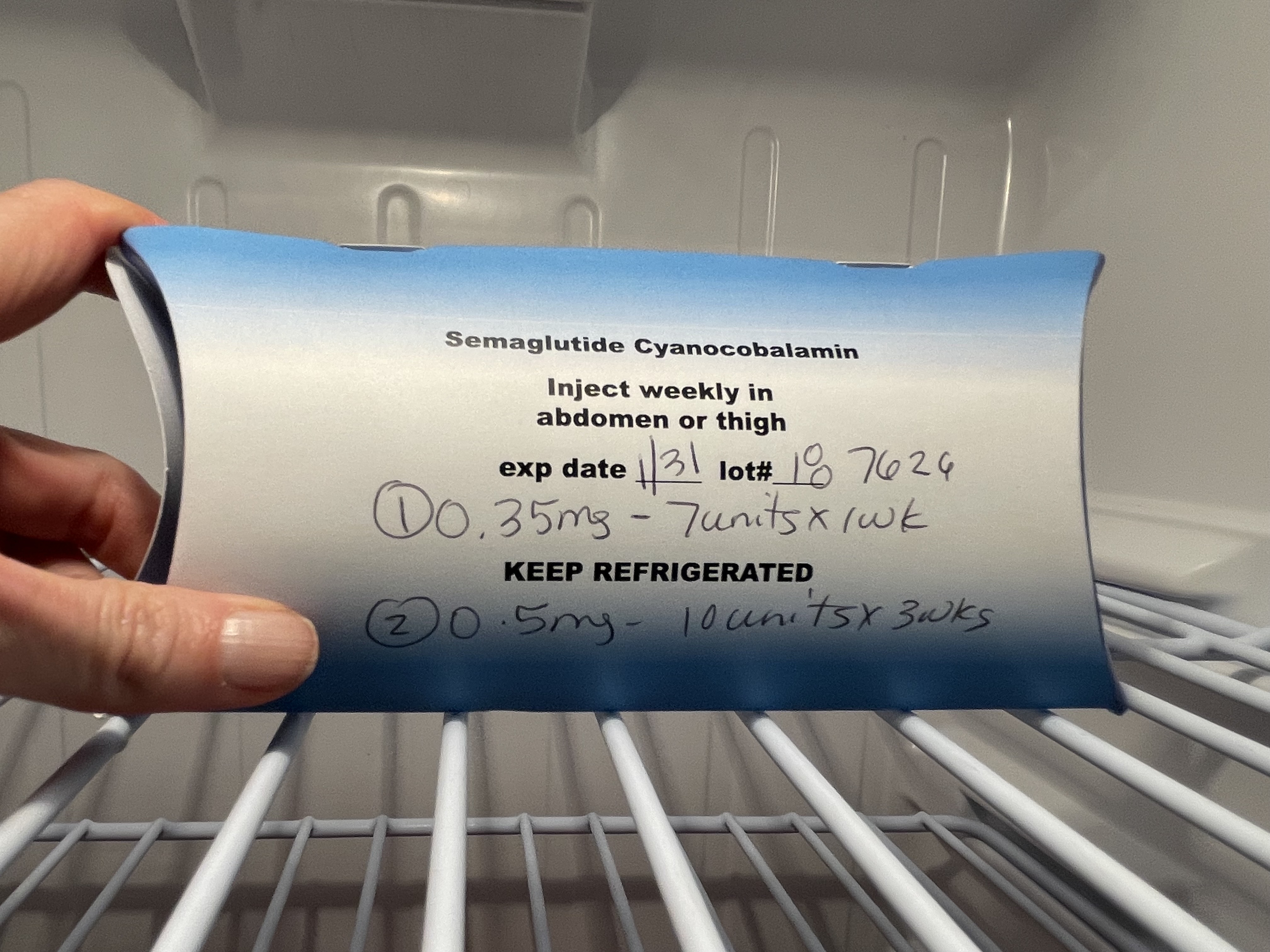On a December afternoon, Scripps News investigative correspondent Catie Beck walks up to a van in a New Orleans city park wearing a hidden camera. About 10 minutes later, she leaves with an envelope of four syringes full of what she’s told is prescription weight loss drugs.
Her name is nowhere on the envelope or the syringes. Neither is a doctor’s name, or a pharmacy name.
As demand for weight loss drugs like the FDA-approved brand names Ozempic and Wegovy continue to cause worldwide shortages, a Scripps News investigation dug into the shadow market for the coveted active ingredient, semaglutide.
We found a wide range of alternate versions advertised for purchase online, some touting sales and discounts. Many were around $200 a month or less – much cheaper than the FDA-approved branded drug, which can run about $1,200 a month.
The Food and Drug Administration has warned patients to be careful about purchasing alternate versions of semaglutide online, writing that some “may be counterfeit, which means they could contain the wrong ingredients, contain too little, too much or no active ingredient at all, or contain other harmful ingredients.”
A Scripps News analysis of the FDA’s Adverse Event Reporting System database shows over 100 reports of "adverse events" experienced by people who reported using alternate versions of semaglutide for weight loss in 2023. In 83% of those cases, we found patients had “serious outcomes” such as hospitalization, disability and even death.
The New Orleans van
NOLA Hydration built its business on treating the hungover in New Orleans with IV fluids, conveniently meeting bachelor and bachelorette parties in their own hotel rooms. But in 2023, it also began publicizing a new service on Facebook, TikTok and Instagram — selling semaglutide injections to lose weight.
Its website claims the prescription drugs are “FDA approved medication.” But the disclaimer in fine print at the very bottom of the same page reads, “These treatments have not been evaluated by the Food and Drug Administration.”
Beck had first inquired about purchasing the injections only a few days earlier by scheduling a free 10-minute “Semaglutide Weight Loss Telehealth Consultation” through the company’s website with “melanie B.” From her home in Virginia, Beck truthfully answered a short list of questions online, which included her address, her height, weight, medical history and current medications. The following day, NOLA Hydration’s owner Melanie Buras called Beck to go over what to expect, including possible side effects.
After about a 10-minute conversation, they had arranged a time to meet so that Beck could pick up a month’s supply of the drugs.
Buras offered to package the medicine so they would stay cool on Beck’s flight back to Virginia. And instead of having Beck measure out her own doses of the medicine at home, Buras said she would pre-fill the syringes.
“We used to give the vial out to everybody,” Buras said over the phone. “But people were not giving themselves the correct dose, ending up in a hospital with pancreatitis because they were giving themselves too much medication.”
The transaction
As kids play on a nearby swing set and tourists eat beignets on an outdoor patio, the NOLA Hydration van pulls up in front of Cafe du Monde in New Orleans City Park, driven by Melanie Buras.
Buras opens the van door and greets Beck. As Beck steps in, Buras lays out four prefilled syringes on a table, along with a promise they’ll deliver quick weight loss results.
“It’s just going to decrease your appetite. You’re not going to think about eating,” she says.
“Now if in about two weeks if you don’t feel any different, then let me know, but usually you’ll feel it within 24 hours of injecting.”
She explains that Beck should inject the shots once a week in her belly, and that the first week’s dose, which is marked, is a smaller quantity of the drug and cautions that when people take too much, they often vomit.
“So if you get sick with the first one, like sick — you don't feel good, let me know,” she says.
And then Buras tells Beck she will have to self-adjust her dose at home for the next shot.
“The second one, you’ll have to split it,” Buras says. “So like you would inject half of it, which would be five units. And then a few days later do the other half.”
“That's the way around that,” Buras says.
Before arriving, Scripps News found a Melanie Buras listed with an active registered nurse license through the Louisiana State Board of Nursing’s website. No state allows registered nurses to prescribe drugs.
But, in the van, Buras reveals that she’s not the only medical professional behind the operation.
“So, it’s me and a doctor,” Buras says.
Scripps News paid $200 for a month’s supply using a company credit card. But, she had also offered to take Venmo, PayPal or a Health Savings Account card.

“And you can just take it anywhere? Show’s on the road?” Beck asks.
“Yeah,” Buras says.
“So, you stay pretty busy?” Beck asks.
“Very busy,” Buras says.
In less than 10 minutes, the transaction in New Orleans was complete.
'Not how things are supposed to happen'
“Walking up to a van in New Orleans is not how things are supposed to happen,” said Science Magazine blogger Derek Lowe, who has spent nearly 35 years as a medicinal chemist in drug discovery for pharmaceutical companies and has studied diet drugs.
“You don't know under what condition these needles were filled. You don't know what's really in them,” he said.
“It's probably semaglutide, but that's not a great basis on which to inject things into your body. And you certainly don't know if these syringes were sterile, how they'd been stored, if they might be contaminated with something inadvertently.”
“Who the hell knows?” he said.
He was especially concerned about the safety of Buras’ guidance to reuse the same syringe twice if it’s determined that a patient should only take half of a dose.
“These are supposed to be single-use syringes,” Lowe said. “The solution is not to use the same syringe twice and leave it sitting out in the fridge or whatever.”
Researchers, doctors and patients have extolled the revolutionary impact on weight loss management, amplified by celebrity endorsements, masses of success stories and a social media frenzy. Lowe said in his decades in the industry, he’s not seen anything like the popularity of this class of drugs.
“Demand is as high as it gets,” he said.
But, that comes with a cost, he said: As manufacturers of the FDA-approved versions struggle to keep up with the supply, opportunists step in.
“There is a black market because of course there are people who are just selling this stuff online or in person or however, and God only knows what they're selling."
‘You don’t even qualify for semaglutide’
Scripps News attempted to purchase semaglutide online from a company called Synergy Health, but unlike our experience with Melanie Buras, Beck spoke directly to a doctor over the phone.
“Your body mass index, which is based on your height and weight, is only 20.5 for you,” the doctor told Beck.
“You don’t even quality for semaglutide,” she said.
The doctor told Beck the body mass index requirement for semaglutide is 30, but said she knows not every caller provides honest information.
“There’s too many people trying to get on semaglutide and are willing to lie about it,” she said.
She wouldn’t prescribe it to Beck, but instead suggested diet and exercise changes if she wanted to lose a few pounds.
FDA has offered this guidance for patients in search of semaglutide: “Patients should only obtain drugs containing semaglutide with a prescription from a licensed health care provider, and only obtain medicines from state-licensed pharmacies or outsourcing facilities registered with FDA.”
Returning to New Orleans
A month after Scripps News purchased the drugs in New Orleans, we returned to give Melanie Buras a chance to explain the business she’s running out of her van. We met her in January in the same park as we had earlier.
Buras was prepared to sell Beck another month’s supply of the drug, but this time we came with more questions instead of the company credit card. Beck told her she was a journalist working on a story about weight loss drugs.
Buras said she’s helped people lose incredible amounts of weight and improve their health.
“We have people that started at 500 pounds, that are down to 300 pounds,” she said. “Now they’re able to reduce the amount of medication that they’re taking for high blood pressure, cholesterol.”
Beck asked her if she thought not being seen by a doctor could be a problem.
“Like in my case, I came here, and I wasn’t seen by a doctor, I got the medication and I walked away,” Beck said. “Is there some inherent risk in that?”
“I guess, you know, yeah,” Buras said.
Buras told us she gets her medicine from a reliable source – an FDA-registered pharmacy out of Texas, and said she could prove it.
“I have a prescription with the name on it, but I didn't bring it,” Buras said. “But I can give that to you next time and like the actual prescription box with your name on it.”
Despite our repeated requests, Buras never provided us with any paperwork that revealed the doctor’s name who wrote Beck's prescription or where the drugs came from.
We did not test the injections she sold us to know what exactly is inside them, but she insists her business is safe.
Scripps News asked about her process of filling the syringes and handing them out to patients.
“Any worries about sterilization or contamination when you do that?” Beck asked.
“No, because it’s not a sterile procedure,” said Buras. “I’m not doing a sterile procedure.”
'That’s actually terrifying’
"You should not be able to just walk up to a van, to a corner grocery, and access these drugs,” said Louisiana State Rep. Jason Hughes. Scripps News recounted our experience in New Orleans with the state lawmaker, who is a member of the state’s House of Representatives Health and Welfare Committee.
“That’s actually terrifying,” he said. “We could have a lot of residents attempting to solve one problem or a weight loss issue, and find themselves in the emergency room and ICU or unfortunately dead, because we don’t know what’s in those vials.”
Scripps News shared our analysis of adverse events reported to the FDA for alternate versions of semaglutide. Hughes said he plans to bring up what we uncovered during Louisiana’s upcoming legislative session.
"We have an obligation to crack down on this issue, to regulate this issue. Because it would potentially save lives.”
A new process
As of this writing, Melanie Buras’ business was still accepting appointments for what it says are "FDA approved medications” for weight loss. But, after returning to New Orleans, she told Scripps News her business had begun using an outside vendor to help screen patients, including a telehealth visit with a doctor.
But, she said, this "added layer of protection" would not be with the same doctor who writes the prescriptions. Though Buras still has not revealed the identity of the prescribing doctor she works with, she referred to them as "Dr. Brandon". It wasn’t clear if "Brandon" was a first or last name.
We'll be following this story. Email Scripps News National Investigative Correspondent Catie.Beck@Scripps.com and National Investigative Producer Carrie.Cochran@Scripps.com with questions or tips.
Trending stories at Scrippsnews.com




